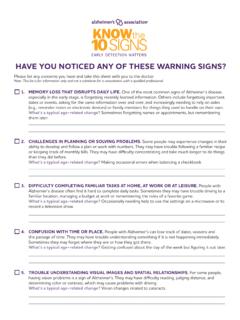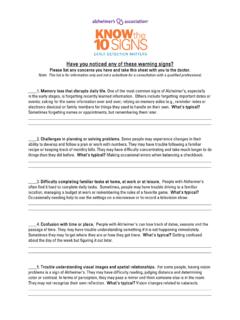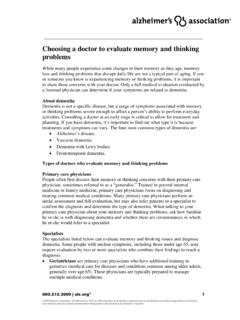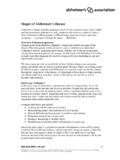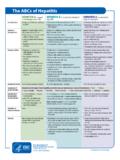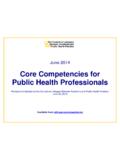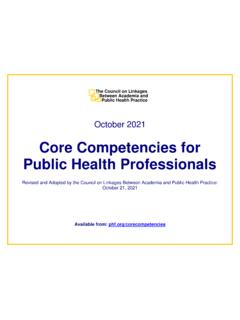Transcription of Communicating with Doctors or Health Care Professionals
1 | 2021 Alzheimer s Association . All rights reserved. This is an official publication of the Alzheimer s Association but may be distributed freely and without charge by unaffiliated organizations and individuals. Such distribution does not constitute an endorsement of these parties or their activities by the Alzheimer s Association. 1 Communicating with Doctors or Health care Professionals Physicians and other medical Professionals are a central part of the care team of a person living with dementia. Along with other members which may include family, friends or others they work to provide support throughout the course of the disease.
2 Effective communication with other care team members particularly Health care providers is critical to ensure that the person living with dementia receives the best possible care. Advice for the person living with dementia Prepare for visits. The following tips can be helpful as you prepare for a visit with a Health care professional : Document any changes in your Health , including your mood, memory and behaviors. Make a note of any changes you ve noticed since your last appointment. Create a list of current prescriptions and over-the-counter medications.
3 Write down any vitamins or supplements you ve added to your medication regimen. Make a list of questions you want to ask. Ask questions. It s normal to have questions about the disease and common to forget what you d like to ask a doctor. Consider bringing a list of questions to each appointment so you re prepared to discuss your concerns. Also, be sure to let the physician or other medical Professionals know if you need additional information or clarification. The Alzheimer s Association National Early-Stage Advisory Group comprising men and women from across the country living with early-stage Alzheimer s or other dementias developed a list of questions to help others make the most of doctor visits.
4 These questions may be helpful as you create your own list to share with the doctor. Diagnosis Which test(s) or tools were used to determine my diagnosis? What were you measuring with the tests performed? Can my symptoms be attributed to any other causes? How did you come to the conclusion of Alzheimer s disease? | 2021 Alzheimer s Association . All rights reserved. This is an official publication of the Alzheimer s Association but may be distributed freely and without charge by unaffiliated organizations and individuals.
5 Such distribution does not constitute an endorsement of these parties or their activities by the Alzheimer s Association. 2 Alzheimer s disease How will the disease progress? What is my prognosis? What can I expect in the future? How will my diagnosis affect my overall Health ? How will this disease affect how I manage my other Health conditions? When do I have to stop driving? Can I still work? If so, in what capacity? Treatments Which treatment options are available? Which symptoms are being targeted by each medication?
6 Are there alternative treatments available? How will the effectiveness of each treatment be measured? Are there any possible side effects? Is one treatment option more likely than another to interfere with medications for other conditions? Clinical studies Which clinical studies are available? Is published information about clinical treatment studies available? What are the possible risks and benefits for participation in a clinical study based on my medical history? Health care team How familiar are you with Alzheimer s disease?
7 Who will be responsible for overseeing my care moving forward? If hospitalization is necessary, will you be able to provide care in this setting? How frequently will follow-up appointments be scheduled? Under what circumstances should I contact you? Who else might be recommended as a member of my care team ( , specialist or counselor)? What would their roles be? At what point will you consider me unable to make my own Health care decisions? How will you work with my care team during the course of the disease?
8 What information will be shared? Care and support What care planning services do you provide? Are there support services and other resources where I can learn more about my diagnosis so I can live a fulfilling life for as long as possible? Are there any lifestyles changes that may help me continue to live well with the disease? | 2021 Alzheimer s Association . All rights reserved. This is an official publication of the Alzheimer s Association but may be distributed freely and without charge by unaffiliated organizations and individuals.
9 Such distribution does not constitute an endorsement of these parties or their activities by the Alzheimer s Association. 3 Advice for members of your care team In the early stage In the early stage of Alzheimer s, the person living with the disease should be included in all conversations regarding care and encouraged to independently share any Health -related observations with the physician and other members of the medical team. If the person appears to need help Communicating his or her needs, you may want to ask permission before interjecting.
10 This is a good time to ask the person living with dementia to sign a release of information so that you can freely communicate with the doctor on the person s behalf when the disease becomes more advanced. As the disease advances Over time, as the person s needs change and ability to communicate declines, the care team should consider which adjustments to make in order to ensure good Health care. The team will also need to provide any updates on behalf of the person with dementia in order to maintain accurate Health records that are accessible in case of an emergency.


